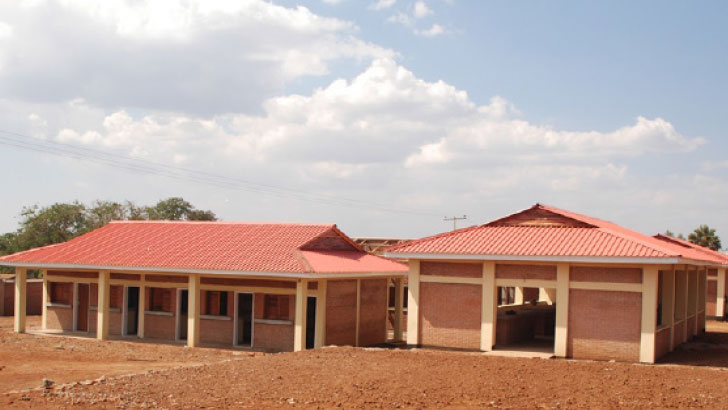Race to develop districts
The ground is set. The tone is right. The time is now for local authorities (LAs) in Malawi to work as duty bearers now that the Governance to Enable Service Delivery (Gesd) project has rolled out.
Gesd is a $100 million (about K75 billion) World Bank grant to the Government of Malawi to be implemented in 28 districts over five-years.
“The project development objective is to strengthen LAs’ institutional performance, responsiveness to citizens, and management of resources for service delivery,” states a Gesd project brief prepared by the World Bank Malawi office.

at Mbulumbuzi in Chiradzulu
The project’s reasoning is that a combination of targeted incentives, increased financing for excellent service delivery and technical assistance will contribute to improved capacity and performance of central government and local councils to deliver basic services, states the brief.
But the project is not just a windfall as others may want to believe.
The LAs will have to meet the minimal access conditions (MACs) to access the funds.
Gesd project coordinator Charles Chunga says the project is implemented under the performance-based grant conditions which mean funding is determined by how LAs perform while meeting the MACs.
He says: “The LAs will have to undergo scanning through local authority performance assessment. This is a process for assessing the LAs’ performance to determine if they are ready to access funding.
“With the funding come major projects in the districts such as improved and quality water supply, improved road infrastructure, among others. It even means more transparency and accountability in the LAs through a vibrant citizen engagement model.”
All the 28 LAs in Malawi will access the funding if they meet the MACs after going through the local authority performance assessment.
“The local authority performance assessment tool, among others, helps to determine whether LAs have basic capacities and safeguards to manage the development grants in order to ensure that good performers are rewarded and bad performers helped to achieve an acceptable capacity level to access resources,” says Chunga.
He says the idea is to make sure that LAs access the funding, and as such, another tool, the performance improvement plan, was developed to rescue the dismally performing LAs.
The performance improvement plan is a process for preparing the LAs using developed or refined guidelines and systems to support them address any identified blockages that might deny them to access the funding.
“The Gesd project wants all local authorities to improve their performance and meet the minimal access conditions,” states Chunga.
He explains that, for example, during preparation of inventory of incomplete projects resourced by the District Development Funding, a number of investment projects in LAs are incomplete.
Therefore, before starting new investments, uncompleted projects will have to be completed and become functional.
The process requires that the performance improvement plan to roll out action to drill the LAs. Targeted key areas to prepare LAs include planning and budgeting for completion of the unfinished investments. This will equip councils with skills of developing and approving annual investment plans.
The project document states that local councils, meanwhile, continue to struggle with capacity gaps, minimal financial accountability, and low incentives to perform – all of which have been cited as justifications for holding back resources, which creates a vicious cycle.
This development has caused uneven and overlapping divisions of responsibility and functions between central and local government.
These bottlenecks result in continued limitations in the coverage, access, and quality of public services delivered to citizens.
Where there are shortfalls, the performance improvement plan will roll out action to prop up the struggling districts and enable them access the funding.
This is not all. Community citizens too have a role to play to ensure that their local authorities perform and meet the minimal access conditions.
A citizen engagement component of the project will work and empower communities to ensure their local authorities are transparent and accountable.
At district level, publicising the annual results of the performance assessment, the annual investment plan, and reporting on its implementation will provide an objective basis for productive contests involving citizens and elected and administrative district officials.
“The project will further support a range of mechanisms for promoting information and feedback flows, including use of community radio, mobile phone messaging and an interactive web-based platform for mapping and monitoring local authorities’ annual investment plans” states the project’s document.
Ministry of Finance director of public finance management system Monaosyile Mhango says the Gesd project is going to be a game changer in public finance management issues and in local authorities’ public services delivery.
She says: “If Gesd is implemented properly as we all expect it should do, it is going to be a game changer. If we do well and meet the minimal access conditions and comply with the performance-based grant conditions to improve service delivery, more lives will be healthier and more Malawians will be educated.”
The project will enable councils to generate their own revenue and to build markets and be sustainable.
“We want to see the impact after five years and to be able to say that we were at this level but now we have developed to this level,” says Mhango.
The LAs will also have to comply with the internal audit responses; the passing rates for primary learners will go up; and they will be more transparent and accountable to the citizens while improving efficiency of public service delivery.
Ministry of Local Government director of local government services Sphiwe Mauwa says the project should inspire LAs to become catalysts for sustainable development for citizen satisfaction.
The project is facilitated by the Ministry of Finance, Ministry of Local Government and the National Local Government Finance Committee as lead implementers.
Other implementing partners include Accountant General, Central Internal Audit Office, Ministry of Economic Planning and Development and Public Sector Reforms, Ministry of Education, Ministry of Health, National Audit Office, and Public Procurement and Disposal of Assets Authority.





